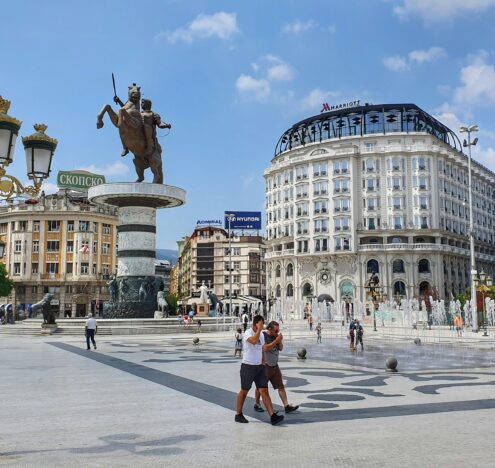This analysis was featured in Critical State, a weekly newsletter from Inkstick Media and The World. Subscribe here.
When order breaks down and war tears a country apart, local warlords are able to create “statelets of the exception,” domains where their rule by force becomes the law. It is common to think of these warlords as freelancers of violence, rebels with more of an interest in plunder than a cause. While warlord rule is often studied as one variety of rebel governance, warlords sympathetic to a collapsing central government also exist, and rule in a meaningfully different way. These pro-government militias, elevated to statelet form, function as allied domains to an embattled central government.
In “Rethinking armed groups and order: Syria and the rise of militiatocracies,” Yaniv Voller argues that pro-government militias offer a kind of outsourced security to an incapable central government, which both use to bolster their legitimacy.
“In militiatocracies, like those that emerged in Syria, Iraq or Sudan in the early years of the twenty-first century, the central government delegates its security commitments to allied militias. These militias then assume much of the burden of fighting insurgents, while the presence of regular forces is thin to non-existent,” writes Voller.
Pro-government militias offer a kind of outsourced security to an incapable central government, which both use to bolster their legitimacy.
These militiatocracies are a symptom of a breakdown in order. Irregular forces can be called into action at the outbreak of a conflict, or may emerge in the course of fighting, as armed local groups consolidate and build power structures that can then, sometimes, choose to ally with a central state.
“Incumbent regimes are usually wary of forces outside direct state control because of their unruliness and potential for disloyalty and poor performance.26 However, a weak central government is compelled to rely on such forces and also limited in its ability to prevent predation and targeting of local populations, even when these processes undermine government interests,” writes Voller.
One effect of these arrangements is that a local pro-government warlord, in exchange for providing security, can demand greater concessions from the central government. Those concessions are easiest to extract when the government is at its weakest and most in need of allies, but the dynamic is such that warlords can set favorable terms for their demobilization, should the war be won and the central government ready to reconsolidate power.
Voller closely examines the role of militias in the Syrian civil war. One feature is that the embattled Assad regime, facing a popular uprising, sought to arm and mobilize ethnic and religious minorities, creating local allies dependent on the central state and fearful of their neighbors. These groups, in turn, took those arms and organized to defend themselves from local violence. As a kind of militia-regime symbiosis, service in militias exempted local recruits from national conscription, which would have sent them to fight far from home.
“Although garnering power in regional enclaves, militia leaders have not become warlords in that they have not sought to destroy the existing order,” concludes Voller. “Their enclaves did not turn into rebelocracies, not simply because they did not seek to overthrow the government, but because their symbolic and actual presence has been crucial for the militia commanders’ legitimacy and the overall sense of security.”




















